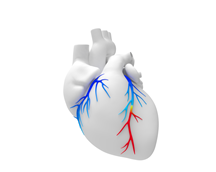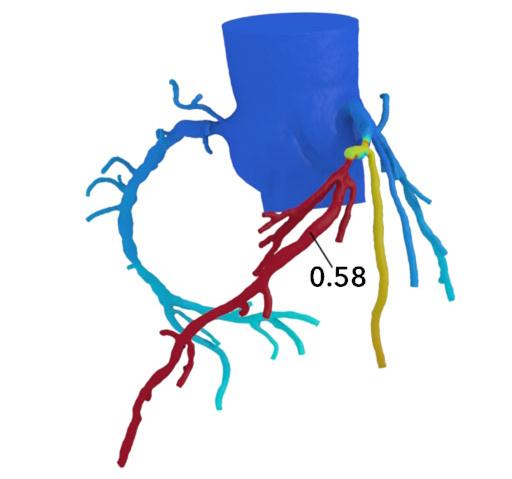Non-Invasive HeartFlow® FFRCT Analysis Helps LHCH Physicians Identify Treatment Approach for Patients with Coronary Artery Disease
Clinicians at Liverpool Heart and Chest Hospital now have access to non-invasive technology that will help them identify the appropriate treatment approach for patients with coronary artery disease.
The technology, called the HeartFlow FFRCT Analysis, is the only non-invasive technology to offer physicians insight into both the extent of a patient’s arterial blockage and the impact the blockage has on blood flow.
 Coronary artery disease, also called coronary heart disease, is the leading cause of death for both men and women in the United Kingdom. Coronary artery disease develops when the arteries leading to the heart narrow, often because of the build up of plaque in the vessel walls. The coronary narrowing can reduce vital blood flow to the heart, causing chest pain and potentially heart attacks.
Coronary artery disease, also called coronary heart disease, is the leading cause of death for both men and women in the United Kingdom. Coronary artery disease develops when the arteries leading to the heart narrow, often because of the build up of plaque in the vessel walls. The coronary narrowing can reduce vital blood flow to the heart, causing chest pain and potentially heart attacks.
Studies have shown the need to improve the accuracy of non-invasive tests used to evaluate coronary artery disease. A recent study, which included data from more than 1,100 U.S. hospitals, found that over half of the more than 385,000 patients with suspected coronary artery disease who underwent an invasive coronary angiogram (ICA) in fact had no need for intervention since no blood flow blockage was found during the ICA.2
“The HeartFlow Analysis is the only available non-invasive technology that provides you two results from one test. There is a reduced need for repeat tests and a more efficient treatment pathway. ” said Dr Tim Fairbairn, Consultant Imaging Cardiologist at Liverpool Heart and Chest Hospital. “We are one of the few NHS trusts in the UK using this technology, and we expect it to help change the way we manage patients with coronary artery disease.”
Dr Joe Mills, Consultant Cardiologist at Liverpool Heart and Chest Hospital, added: “The HeartFlow FFRct Analysis provides a definitive understanding of both the anatomical and functional findings, without any additional testing or risk for patients.
“Application of the HeartFlow FFRct Analysis is likely to transform the quality of care we can provide for patients, ensuring the most accurate diagnosis and the best treatment plan, as well reducing the need for invasive coronary angiography – a procedure not without its risks.”
The HeartFlow technology creates a personalised, digital 3D model of each patient’s arteries using the images derived from a standard, non-invasive coronary CT angiogram (cCTA). Powerful computer algorithms then solve millions of complex equations to assess the impact of blockages on blood flow. This information aids physicians in determining the appropriate course of action for each patient.
The HeartFlow Analysis has been evaluated in four large, prospective clinical trials enrolling a total of more than 1,100 patients at major medical centres worldwide. The most recent, called PLATFORM (Prospective LongitudinAl Trial of FFRCT: Outcome and Resource IMpacts), demonstrated that a HeartFlow-guided patient evaluation strategy effectively identifies which patients do and do not need invasive treatment.
When compared to usual care, a HeartFlow-guided strategy showed an 83% reduction in the number of patients who underwent a planned ICA only to find that they in fact had no obstructive disease, and therefore, no need for invasive intervention. Despite the difference in the number of patients who required ICA, the rate of revascularisation procedures, such as coronary stenting or bypass surgery, were similar.3
Results from the trial were published in the European Heart Journal and the Journal of the American College of Cardiology.3,4
“We are confident that the HeartFlow Analysis will be a game-changing technology that will be beneficial for both our patients and the organisation,” Dr. Fairbairn said.
About HeartFlow Inc.
HeartFlow, Inc. is a personalised medical technology company seeking to transform the way cardiovascular disease is diagnosed and treated. The company’s HeartFlow FFRct Analysis is the first available non-invasive solution that enables a physician to more accurately evaluate whether a patient has significant coronary artery disease (CAD) based on both anatomy and physiology. The solution, which leverages deep learning to create a personalized 3D model of the patient’s arteries, is well positioned to become an integral part of the standard of care for patients who are at risk for CAD because of its potential to improve clinical outcomes, improve the patient experience and reduce the cost of care. The HeartFlow FFRct Analysis is available in the United States, Canada, Europe and Japan.
For more information visit heartflow.com/uk or call 0800 031 5265 or email info-uk@heartflow.com
2 Patel, et al., Am Heart J 2014; 167:846-852.e2.
3 Douglas, et al., Euro Heart J 2015.
4 Hlatky, et al., J Am Coll Cardiol 2015.